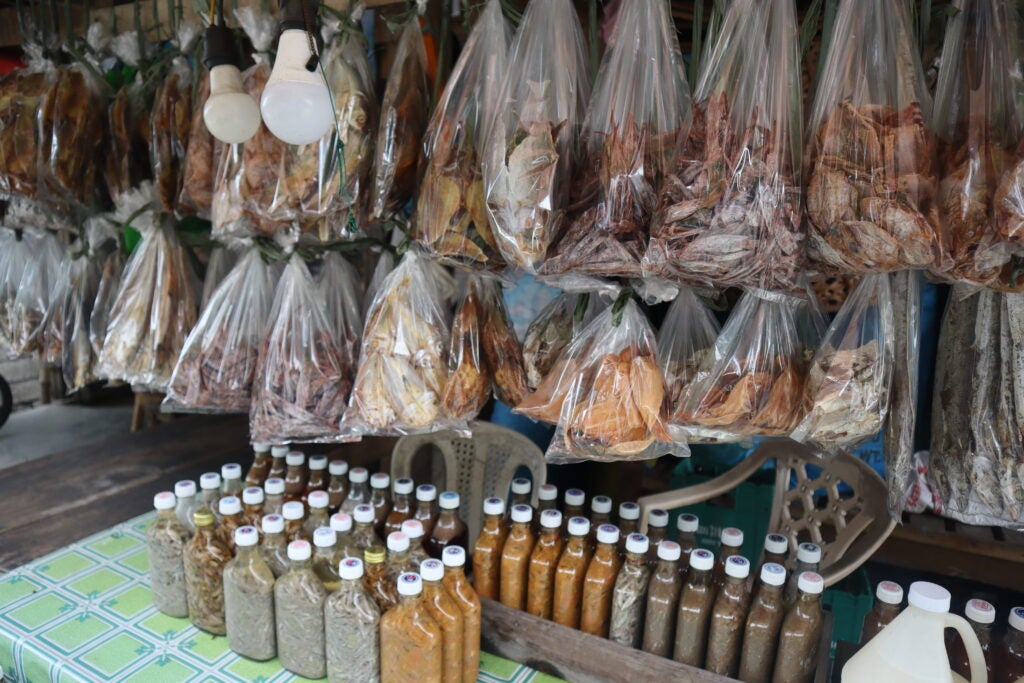Oceana lauds Northern Samar provincial gov’t for adopting science-based fisheries management and committing to post-harvest and market support
Press Release Date: September 9, 2024

International environmental organization Oceana commends Northern Samar Governor Edwin Ongchuan for the determination to adopt the science-based approach to managing the fisheries of the province and for his positive response to address the critical issue of post-harvest fish losses, the dire state of the locals’ nutrition and pervasive poverty in the province as articulated in the Oceana study covering Samar and Northern Samar.
The findings of Oceana’s study showing market losses that are as high as 38.39 percent of the province’s total catch from harvesting to marketing stages was presented by Oceana’s Campaign and Research Director, Lawyer Rhea Yray-Frossard during the Provincial Development Council meeting recently.
The comprehensive and pioneering study focused on the towns of Allen, Victoria, San Isidro, as well as Capul, San Antonio, and San Vicente – all part of the San Bernardino Local Government Unit Alliance of Northern Samar (SaBeLANS).
Among the key observations, San Vicente reported the highest physical losses during the fishing stage, especially during the glut season for tuna and sardines. Because of a lack of cold storage and processing facilities, 85 percent of the quality of fish is lost. Allen also experienced predominant quality losses due to reduced freshness, physical damage, and substandard sizes of export species.
“In Victoria, the situation is even worse. The local fishers catch is undervalued by up to 75 percent during peak seasons due to market pressures. This loss means less money for families who largely rely on these fish to feed their children and support their households and loss of food for the communities as municipal catch is largely for domestic consumption. In contrast, comparatively lower losses were observed in San Isidro and Capul due to their more efficient food distribution chains and the adoption of home-based technologies such as drying fish on makeshift bamboo platforms, processing fermented fish paste (bagoong) & fish sauce (patis) in bags and recycled containers. These help them make the most out of anchovy in oversupply. Old, recycled refrigerators are used for cold storage because Capul has no public market. Still, even these areas with lower losses, the struggle is apparent. We need to provide urgent, comprehensive support to protect these vulnerable communities,” Yray-Frossard explained.
Oceana worked with the Center for Sustainable Aquaculture and Agri-based Innovations (CENSAAI) led by Dr. Ronelie Salvador, fisheries expert in producing the report that was done in 2023. During the meeting, Salvador shared the following recommendations to curb post-harvest fish losses:
- Quantify losses at each stage in the distribution chain.
- Improve and institutionalize reporting and monitoring systems.
- Provide livelihood support to mobile vendors and women, train them on post-harvest handling and preservation.
- Through Local Government Units, set limitations on the fish catch volume of species reported to have high losses during peak seasons to reduce waste.
- Establish post-harvest facilities such as cold storage facilities for the processing and preservation of catch with participation by stakeholders
Northern Samar Governor Edwin Ongchuan and other key officials were present during the meeting which was aimed at determining evidence-based policy decisions to enhance the sustainability and efficiency of the region’s fishery industry.
Oceana has been working with Fisheries Management Area (FMA) 7 that covers the San Bernardino Strait of Northern Samar to address these critical issues through the Fisheries Management 7 Plan to promote sustainable fisheries and reduce post-harvest losses. Based on the findings and recommendations of the Scientific Advisory Group, the deterioration of sardine stocks in Northern Samar is attributed to overfishing and destructive fishing practices. FMA 7 Management Body has adopted the resolution to implement the National Sardines Management Plan (NSMP).
The Alliance of Samar Bays and Channels and the Samar Sea Alliance for Fisheries Management and Development (Samar) composed of 21 LGUs and the six component LGUs of SaBeLANS in Northern Samar were the first to issue local resolution adopting the NSMP in their own locality – pioneering in the country. It is possible that they will be among the first LGUs to implement the Sardine Management Plan in the country. (END)
Oceana is the largest international advocacy organization dedicated solely to ocean conservation. Oceana is rebuilding abundant and biodiverse oceans by winning science-based policies in countries that control one-quarter of the world’s wild fish catch. With more than 300 victories that stop overfishing, habitat destruction, oil and plastic pollution, and the killing of threatened species like turtles, whales, and sharks, Oceana’s campaigns are delivering results. A restored ocean means that 1 billion people can enjoy a healthy seafood meal every day, forever. Together, we can save the oceans and help feed the world. Visit Oceana.org to learn more.
For More Information:
Joyce Sierra, Communications Manager, Oceana
Mobile: 09178214430 E-mail: jsierra@oceana.org
Facebook: www.facebook.com/oceana.philippines
Twitter: @oceana_ph Instagram: @oceana_ph
